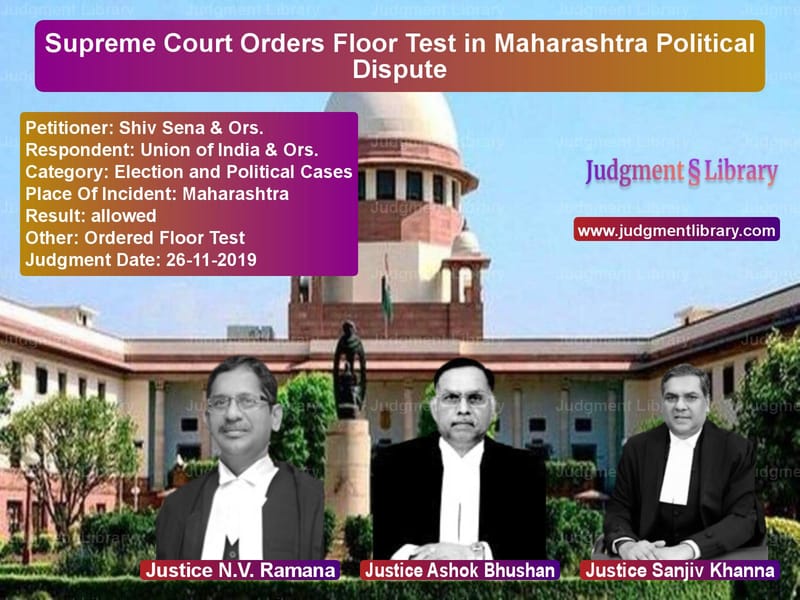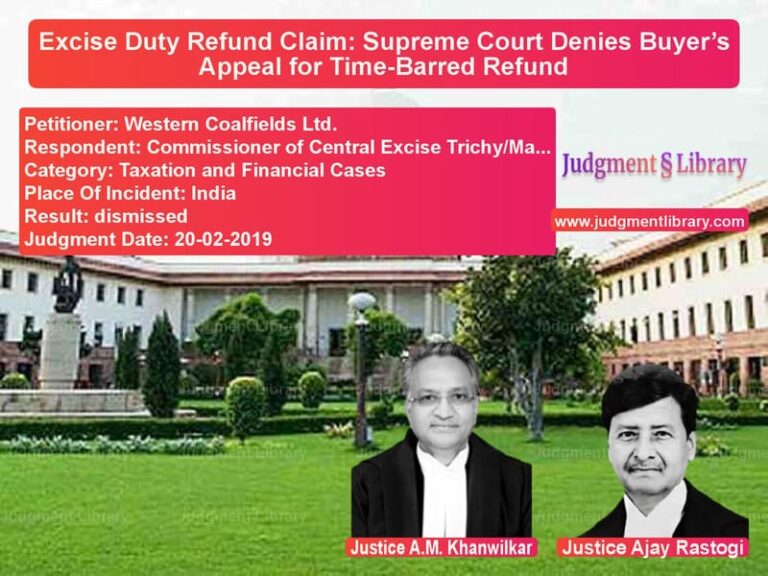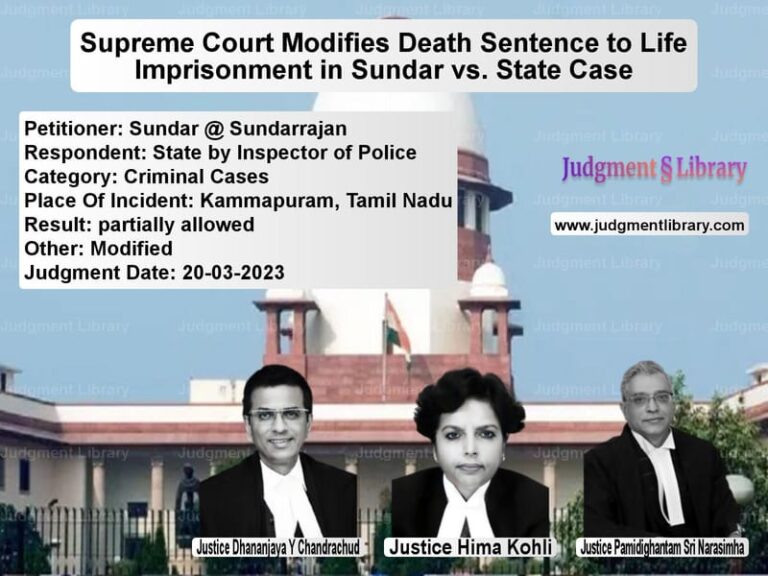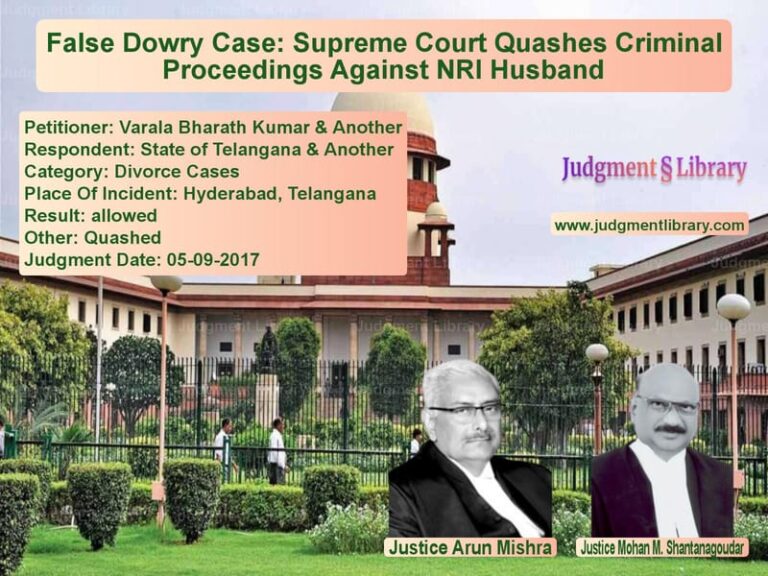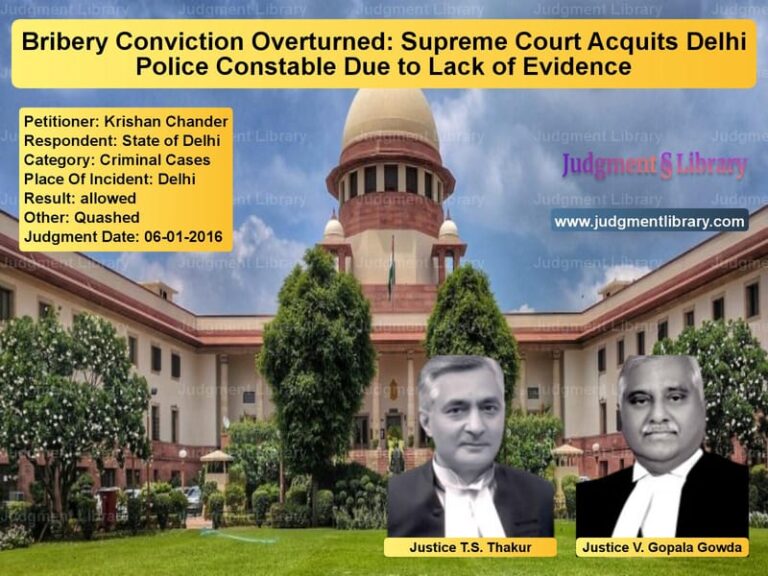Supreme Court Orders Floor Test in Maharashtra Political Dispute
The Supreme Court of India, in its judgment dated November 26, 2019, delivered a historic ruling in the case of Shiv Sena & Ors. vs. Union of India & Ors.. The case revolved around the Maharashtra Legislative Assembly elections and the dramatic sequence of events that led to an unexpected government formation. This judgment reaffirmed democratic principles and set a precedent for handling similar political disputes in the future.
Background of the Case
The political crisis in Maharashtra began after the Legislative Assembly elections were held in October 2019. The election results produced a hung assembly, with no single party securing an absolute majority. The major parties in the fray were:
- Bharatiya Janata Party (BJP) – 105 seats
- Shiv Sena – 56 seats
- Nationalist Congress Party (NCP) – 54 seats
- Indian National Congress (INC) – 44 seats
The BJP and Shiv Sena had contested the elections together but failed to reach an agreement on power-sharing, leading to a political deadlock. Consequently, the Governor invited the BJP to form the government. Upon its failure, the Shiv Sena and then the NCP were invited, but they too failed to prove a majority. As a result, President’s Rule was imposed on November 12, 2019.
The Surprise Government Formation
In an unexpected turn of events, on November 23, 2019, at 5:47 AM, President’s Rule was revoked, and by 8:00 AM, Devendra Fadnavis (BJP) was sworn in as Chief Minister, with Ajit Pawar (NCP) as Deputy Chief Minister. This raised several constitutional and ethical questions, leading the Shiv Sena, NCP, and INC to approach the Supreme Court, alleging that the Governor had acted arbitrarily.
Petitioner’s (Shiv Sena, NCP, INC) Arguments
- The sudden revocation of President’s Rule and the swearing-in of Devendra Fadnavis were conducted in secrecy and violated democratic principles.
- Ajit Pawar’s letter of support to the BJP was misleading, as the NCP leadership had not endorsed his decision.
- A floor test should be conducted immediately to establish the legitimacy of the government.
- Transparency was necessary, and the entire floor test proceedings should be broadcast live.
Respondent’s (BJP, Governor of Maharashtra, Union of India) Arguments
- The Governor acted in his discretionary power under Article 164 of the Constitution and was satisfied with the letters submitted by Devendra Fadnavis and Ajit Pawar.
- The court should not interfere in political matters as the Governor was performing his constitutional duty.
- The demand for an immediate floor test was unnecessary.
Supreme Court’s Observations
- The floor test is the best way to determine the legitimacy of a government.
- Judicial review of the Governor’s actions is permissible when there is prima facie evidence of arbitrariness.
- Post-election alliances are a political reality and should be tested in the legislature.
Final Judgment
The Supreme Court ordered an immediate floor test to be held on November 27, 2019. The key directives were:
- A pro-tem Speaker would be appointed to conduct the floor test.
- All MLAs would take the oath before the vote.
- The voting would be conducted through an open ballot.
- The proceedings would be broadcast live.
Aftermath of the Judgment
Following the Supreme Court’s ruling, the floor test was scheduled, but before it could take place, Devendra Fadnavis and Ajit Pawar resigned on November 26, 2019. This led to the formation of the Maha Vikas Aghadi (MVA) alliance comprising the Shiv Sena, NCP, and INC, with Uddhav Thackeray taking oath as Chief Minister.
Impact of the Judgment
- Strengthens Parliamentary Democracy: Ensuring that the legitimacy of a government is tested in the legislature and not through executive decisions.
- Reinforces Judicial Review: Demonstrates that courts can intervene in political matters when constitutional norms are violated.
- Prevents Undemocratic Practices: Ensures that floor tests are conducted promptly to prevent horse-trading.
Conclusion
The Supreme Court’s ruling in Shiv Sena & Ors. vs. Union of India & Ors. underscores the importance of democratic principles and constitutional morality. The judgment reaffirmed that legislative confidence is the foundation of government legitimacy, ensuring that political maneuvering does not override constitutional norms.
Petitioner Name: Shiv Sena & Ors..Respondent Name: Union of India & Ors..Judgment By: Justice N.V. Ramana, Justice Ashok Bhushan, Justice Sanjiv Khanna.Place Of Incident: Maharashtra.Judgment Date: 26-11-2019.
Don’t miss out on the full details! Download the complete judgment in PDF format below and gain valuable insights instantly!
Download Judgment: Shiv Sena & Ors. vs Union of India & Ors Supreme Court of India Judgment Dated 26-11-2019.pdf
Direct Downlaod Judgment: Direct downlaod this Judgment
See all petitions in Public Interest Litigation
See all petitions in Fundamental Rights
See all petitions in Separation of Powers
See all petitions in Judgment by N.V. Ramana
See all petitions in Judgment by Ashok Bhushan
See all petitions in Judgment by Sanjiv Khanna
See all petitions in allowed
See all petitions in Ordered Floor Test
See all petitions in supreme court of India judgments November 2019
See all petitions in 2019 judgments
See all posts in Election and Political Cases Category
See all allowed petitions in Election and Political Cases Category
See all Dismissed petitions in Election and Political Cases Category
See all partially allowed petitions in Election and Political Cases Category

